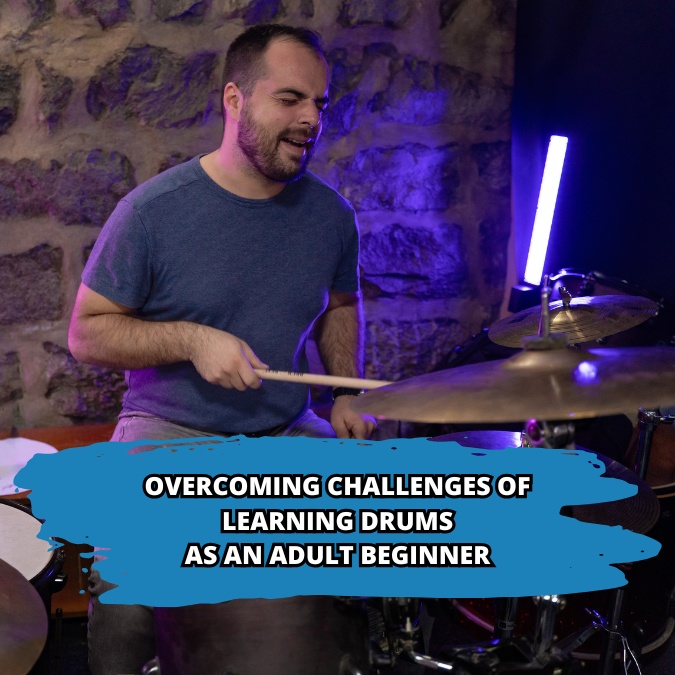Overcoming Challenges of Learning Drums as an Adult Beginner

Why Learning Drums as an Adult is Different
Physical and Mental Challenges
Adults may find drumming physically demanding due to less flexibility or endurance compared to younger learners. Building hand-eye coordination can take longer, but consistent practice helps develop this skill. Mentally, adults may struggle with patience and self-criticism, making it important to focus on incremental progress. Developing fine motor skills required for drumming also takes time and dedication, which adults should embrace as part of the process.
Time Constraints and Busy Schedules
Adults often have busy schedules filled with work, family, and social commitments, making practice time scarce. Scheduling short, focused sessions can help maximize learning despite limited availability. Practicing in the morning or during lunch breaks can be an effective way to maintain consistency. Prioritizing learning drums as an adult as a valued hobby ensures it becomes part of a sustainable routine.
Overcoming Self-Doubt and Fear of Failure
Self-doubt is a common barrier for adults starting new skills, including drumming. Focusing on small victories, like mastering a basic rhythm, can boost confidence over time. Joining a supportive community or taking lessons with a patient instructor can reduce anxiety and improve self-esteem. Remembering that mistakes are a natural part of learning helps shift the focus to progress rather than perfection.
Strategies for Improving Coordination and Rhythm
Start with Simple Exercises
Simple exercises like single-stroke rolls and basic beats are excellent starting points for adult beginners. These exercises build foundational skills while minimizing frustration. Practicing these rudiments daily strengthens muscle memory and coordination. Gradually increasing speed and precision helps adults gain confidence in their drumming abilities.
Use a Metronome for Practice
A metronome is an invaluable tool for developing timing and rhythm. Practicing with a metronome ensures you stay consistent, even as you advance to more complex patterns. Start at a slow tempo to build accuracy and gradually increase the speed. This habit not only improves rhythm but also builds discipline in “learning drums as an adult.”
Gradually Increase Complexity
Once comfortable with basic exercises, adults should challenge themselves with slightly more complex patterns. Adding syncopation, off-beat hits, or fills helps expand coordination and rhythmic understanding. Introducing limb independence—such as playing different rhythms with each hand and foot—provides the next step in skill development. These challenges keep learning exciting and rewarding.
Finding Time to Practice Drums as an Adult
Create a Realistic Practice Schedule
A realistic practice schedule accounts for an adult’s busy life and ensures regular progress. Allocating 15-30 minutes daily is often more effective than longer, inconsistent sessions. Planning practices during low-stress times of the day reduces the likelihood of skipping sessions. Writing down a schedule or setting reminders can also enhance accountability.
Use Short, Focused Practice Sessions
Short practice sessions that focus on one skill at a time are more effective than lengthy, unfocused sessions. For example, dedicate one session to rhythm exercises and another to learning a song. These bite-sized lessons fit into busy schedules and prevent burnout. Concentrating on specific goals also accelerates skill acquisition.
Turn Practice into a Daily Habit
Making drumming a daily habit ensures consistent improvement over time. Linking practice to an existing routine, like right after dinner, helps solidify the habit. Practicing at the same time each day creates predictability and reduces decision fatigue. Consistency is key when learning drums as an adult, and forming a habit makes it easier to stay committed.
Building Confidence as an Adult Beginner
Celebrate Small Wins
Acknowledging small victories, such as mastering a basic beat or playing through a song, builds confidence. Rewarding progress keeps motivation high and reduces feelings of frustration. Tracking milestones, like keeping a journal of achievements, helps adults see their growth over time. Celebrating wins reinforces the idea that every step forward matters.
Learn in a Supportive Environment
A supportive environment, whether through private lessons or group classes, fosters encouragement and growth. Having an instructor who understands the unique needs of adult learners is invaluable. Group settings also offer opportunities to connect with peers and build confidence. Positive reinforcement from others enhances self-belief and motivation.
Focus on Personal Progress, Not Perfection
Comparing progress to others can hinder confidence and lead to self-doubt. Focusing on individual improvement ensures that the learning journey remains positive and rewarding. Emphasizing effort over results helps adults appreciate the learning process itself. Setting personal goals tailored to one’s pace makes progress more fulfilling.
Tools and Resources for Adult Drum Learners
Recommended Beginner-Friendly Drum Kits
Beginner-friendly drum kits designed for adults offer comfortable sizing and easy setups. Electronic drum kits are an excellent option as they are quieter and more space-efficient for home use. Acoustic kits with adjustable hardware and beginner-friendly cymbals are ideal for those who prefer a traditional feel. Researching well-reviewed brands and testing drum kits in-store can help adults find the perfect fit for their needs.
Online Courses and Apps for Learning Drums
Online courses and mobile apps provide flexible learning options for adults with busy schedules. Platforms like Drumeo and YouTube offer comprehensive lessons that cater to all skill levels. Apps with interactive features, such as rhythm games, make practicing more engaging. Combining digital resources with in-person lessons can create a balanced and effective learning experience.
Tips for Choosing the Right Drum Instructor
Selecting an instructor who understands the challenges of learning drums as an adult is crucial for success. Look for teachers with experience working with adult beginners and who offer personalized lesson plans. A patient and encouraging teaching style helps build confidence and ensures a positive experience. Reading reviews or asking for recommendations can guide you to the right instructor.
Staying Motivated While Learning Drums
Set Achievable Goals
Setting small, achievable goals keeps motivation high and prevents overwhelm. For example, aim to master a basic beat or play along to a simple song within a week. Breaking larger goals into smaller milestones makes progress manageable and rewarding. Regularly revisiting and adjusting goals ensures they remain realistic and aligned with your abilities.
Play Along to Your Favorite Songs
Playing along to favorite songs makes practice more enjoyable and reinforces skills learned in lessons. Start with songs that have simple drum patterns and gradually increase difficulty as confidence grows. Learning songs you love creates an emotional connection to the instrument and boosts motivation. It also provides a fun way to practice timing and rhythm.
Connect with a Community of Fellow Learners
Joining a community of fellow drummers fosters motivation and accountability. Participating in local drum circles or online forums provides support and encouragement from like-minded individuals. Sharing progress, challenges, and achievements with others helps maintain enthusiasm. Being part of a community also opens opportunities for collaboration and inspiration.
Final Thoughts on Learning Drums as an Adult
Embrace the Journey, Not Just the Destination
Learning drums as an adult is a journey filled with opportunities for growth and self-discovery. Embracing the process and celebrating small victories make the experience more rewarding. Patience and consistency are key, and progress often happens in unexpected ways. By focusing on the joy of learning, adults can find fulfillment in every step of the journey.
Why Age Shouldn’t Hold You Back
Age is not a barrier to learning drums or any other new skill. Adults bring unique qualities like discipline, focus, and determination to their learning journey. The benefits of drumming, from stress relief to improved coordination, are accessible at any age. With the right mindset and resources, learning drums as an adult can be a deeply enriching experience.
FAQ
Q: Can adults really learn to play drums well?
A: Yes, adults can absolutely learn to play drums well with consistent practice and the right guidance. Age is not a limitation; many adult learners find great success and enjoyment in picking up drumming later in life.
Q: How much time should an adult spend practicing drums?
A: Adults should aim for 15-30 minutes of focused practice daily. Short, consistent sessions are more effective than infrequent, lengthy ones for building skills over time.
Q: What type of drum set is best for adult beginners?
A: Electronic drum kits are a great choice for adult beginners due to their compact size and noise control. Acoustic drum sets with beginner-friendly features are another excellent option for those seeking a traditional experience.
Q: Are online drum lessons effective for adults?
A: Yes, online drum lessons can be highly effective, especially for adults with busy schedules. They offer flexibility and a variety of resources, which can be complemented by in-person lessons for personalized feedback.
Q: What are the biggest challenges of learning drums as an adult?
A: Common challenges include time management, developing coordination, and overcoming self-doubt. However, with a structured practice routine and a supportive learning environment, these challenges can be successfully overcome.


